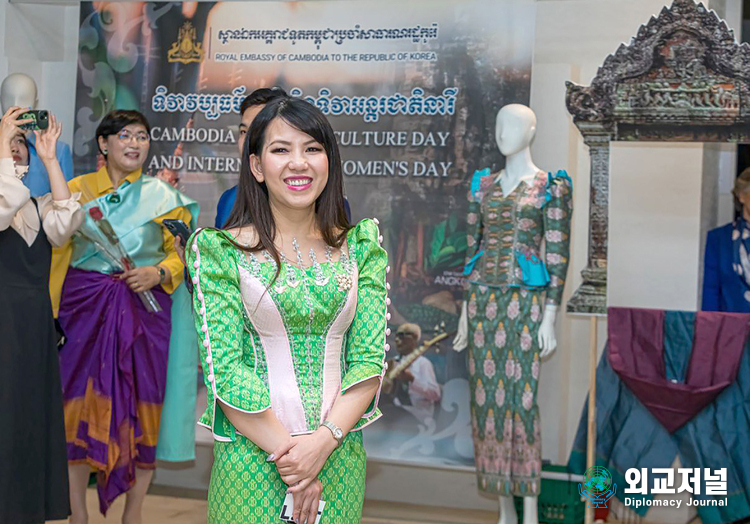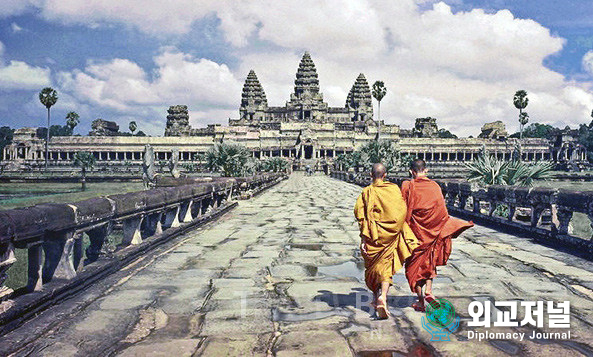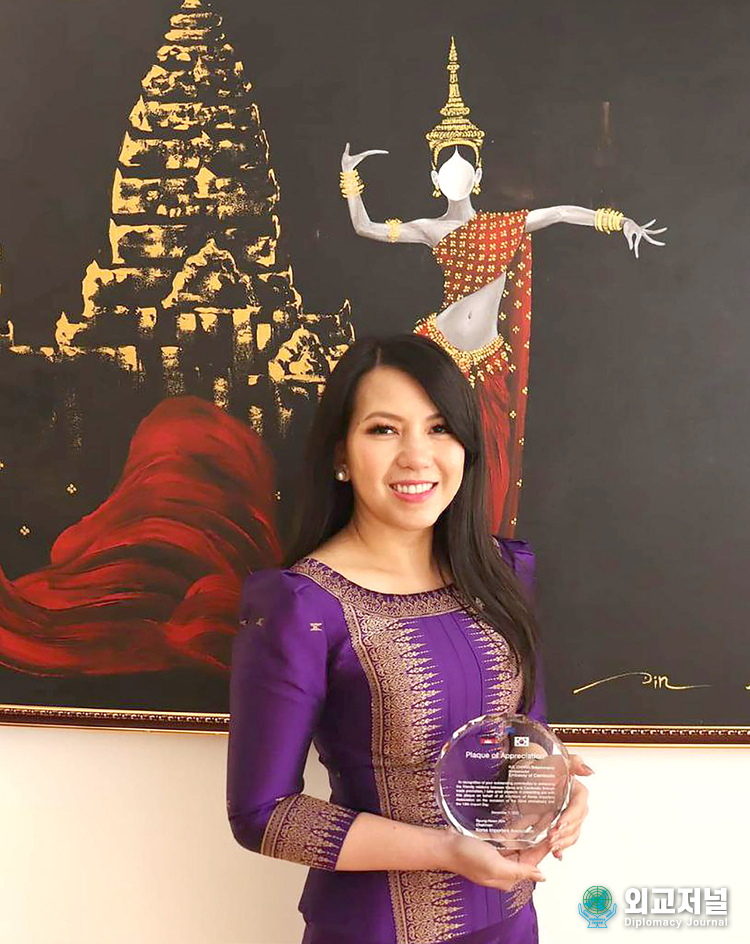
Ambassador Chring Botumransay of the Kingdom of Cambodia said that the Republic of Korea has played a pivotal role in promoting Cambodia’s social-economic development and in diversifying foreign relations.
“Indeed,” the lady ambassador said, “our trade relationship is modest but expanding rapidly and the trade volume between the two countries was valued at US$1,050 million in 2022, an 8.85% rise compared to 2021.
The Republic of Korea, on her side, has a very favorable view of the Kingdom of Cambodia. In particular, the Ministry of Foreign Affairs of Korea has a very favorable view of Cambodia.
In 2022 alone, according to a MOT introduction of Cambodia, there were high-level exchanges, such as President Yoon Suk-yeol's visit to Cambodia on the occasion of the Korea-ASEAN Summit, Prime Minister Hun Sen of Cambodia, and Senator Sai Cho-heum's visit to Korea. Trade between the two countries has reached a scale of 1 billion dollars, and Korea's cumulative investment in Cambodia has exceeded 4.8 billion dollars, it said. (See further details at the end of this report.)
Ambassador Botumransay spoke on a wide range of topics at an interview with The Korea Post media, publisher of 3 English and 2 Korean-language news publications since 1985, which included details of conclusion of trade agreement between her wonderful country of Cambodia and Korea. Details of the interview follow:
Question: Our hearty congratulations on the conclusion of the bilateral trade agreement between the two friendliest countries in the world. Please introduce the details of the Agreement.
Answer: It is no doubt that the Cambodia-Korea Free Trade Agreement (CKFTA) will raise bilateral trade volume and create more new export opportunities between Korea and Cambodia. Please let us know your point of view on the economic outlook of the two countries.
Last year, Cambodia and the Republic of Korea (ROK) celebrated the 25th anniversary of the establishment of official diplomatic relations. Although the two countries embarked on establishing a diplomatic relation in the late 1990s, we have made tremendous efforts to move relations to a new height.
From an economic and strategic point of view, for ROK, Cambodia is an attractive destination for its investment and expanding its footprint due to the country’s conducive investment environment and strategic location in the heart of the Greater Mekong Region.
For Cambodia, the ROK has played a pivotal role in promoting Cambodia’s social-economic development and in diversifying foreign relations. Indeed, our trade relationship is modest but expanding rapidly. The trade volume between the two coun tries was valued at US$1,050 million in 2022, an 8.85% rise compared to 2021.
Garments, electronics, shoes, luggage, aluminum, beverages, medical supplies, and natural rubber are among Cambodia’s top exports to the ROK while construction vehicles including trucks and bulldozers, clothes, electronics and cosmetic productions are imported from the ROK to Cambodia.
On top of that, the Cambodia-Korea Free Trade Agreement (CKFTA), which came into effect on 29 January 2022, not only testifies to the two countries’ mutually high priority but also turns the page on state-to-state ties.
Whi le Seoul and Phnom Penh are bound together by the ASEAN-Korea Free Trade Agreement (AKFTA) and the Regional Comprehensive Economic Partnership (RCEP), CKFTA would help further strengthen and deepen the economic cooperation between the two countries that ultimately creates more employment and investment opportunities and promotes services exports, contributing more to economic growth and bringing more benefits to both peoples.
In just a quarter century of diplomatic ties, the two countries have built strong ties in many areas, including economic and political affairs, social-cultural ties, labor and especially development cooperation. Built on these facts, I am optimistic that both countries will work in tandem to elevate Cambodia-ROK relations to a “strategic partnership” level in the near future.

Q: Please introduce investment environment of Cambodia and special favors to foreign investors.
A: Cambodia has proved to become a conductive investment environment for over the past two decades. There are three key reasons why the country is a promising investment environment for foreign investors.
First, Cambodia has achieved rapid economic growth and has become one of the fastestgrowing economies in the world in terms of GDP.
For the last ten years, the country’s economy has grown rapidly—at a 10% CAGR— while its electricity infrastructure has also As of 30/03/23 2 made considerable strides, with costs falling by over 20% and capacity rising by more than ten times. In the post-COVID era, the Ministry of Economy and Finance of Cambodia estimates a growth of 6.6% for 2023, proving that the Kingdom still offers an attractive investment climate.
In addition to the robust economic growth, Cambodia has also managed to maintain a stable inflation rate, foreign exchange rate, and unemployment rate, creating a conducive environment for business operations in terms of predictability.
Second, Cambodia’s young, active workforce and competitive wages make the country the best place to invest. Of the approximately 16 million people in Cambodia, more than 60% are under 35 years old. According to the 2018 report of the International Labor Organization (ILO), Cambodia has the highest percentage of labor force participation among those aged 16 to 64, at 82.7%. Compared with regional countries, the country has also one of the most competitive wages in Asia, with a US$ 200 monthly minimum wage level (as of 2023) for the textile, garment, and footwear industries.
Moreover, there is no discrimination against foreign-owned companies, which means all investors are guaranteed fair treatment, both foreign and domestic. The Royal Government of Cambodia (RGC) also reiterates its three “NOs” principles in the new investment law, namely “No nationalization”, “No expropriation,” and “No price control.” Third, Cambodia has developed a vibrant trade infrastructure that is connected to the region and beyond with favorable trade agreements, proximity to key markets, and a growing logistical infrastructure.
Even though Cambodia is a small state, it is part of a large and dynamic region, ASEAN, with a combined population of over 660 million and an estimated total GDP of US$3.2 trillion in 2019. While the Kingdom is also part of ASEAN’s FTA with China, Japan, Korea, India, Australia, and New Zealand, it also joins a mega-regional trade deal called the RCEP which contributes about 30% of global GDP and more than a quarter of world exports. On top of that, Cambodia has heavily invested in infrastructures such as fast speed highways and bridges, airports, railways, waterways and ports, energy, and a communication system.
Regarding the special favors given to foreign investors, Cambodia has developed itself into a business-friendly government through the active promotion of Foreign Direct Investment (FDI) to attract foreign investors.
RGC has recognized the indispensable role of FDI in securing and boosting the country’s economic growth. Within this context, RGC has introduced a new Law on Investment to solidify and expand the country’s competitiveness for foreign investors through the modernization of domestic industries, the protection of investor rights, and the provision of a variety of incentives.
Generous FDI incentives available to investors include (1) income tax exemption from 3 to 9 years or special depreciation, (2) export tax exemption, (3) full import duty tax exemption of capital goods including construction material, equipment, and production inputs, (4) nonrestrictions for investors on foreign currencies convertibility and repatriation, (5) 100% foreign ownership of companies, and (6) 150% tax deduction for Research & Development (R&D), innovation, training, employee welfare facilities & services, and machinery upgrading.
RGC also simplified the procedures for registration and implementation of an investment project for foreign investors. For instance, submitted investment project As of 30/03/23 3 proposals shall be reviewed through the One-Stop Service by the Council for the Development of Cambodia (CDC), which takes approximately 20 working days to issue a Registration Certificate.
Q: Please introduce the outstanding Korean companies contributing to the promotion of relations between the two countries.
A: Cambodia is encouraging Korean investors to pursue opportunities in Cambodia offered by five key sectors - green infrastructure, agriculture, tourism, logistics, and digital development.
Indeed, many Korean investors have already invested in Cambodia in various fields such as garments, energy, construction, and tourism, with companies like SPHP (Cambodia) Co., Ltd., Tong Yang Corporation KCD Co. Ltd., Cambo Kotop LTD., Cambo Unisoll Ltd., Woorie Garments Co., Ltd., Booyoung Khmer II Co., Ltd., Kookmin Bank Cambodia PLC, and Shinhan Bank Cambodia Plc.

Q: To our knowledge, Cambodian Government announced “2023 Cambodia Visit Year”. Please introduce special events prepared for foreign tourists.
A: The Cambodian government has announced the "Visit Cambodia Year 2023" campaign, with the slogan "Every Day is A Wonder," to showcase the Kingdom's tourism potential and to welcome international tourists.
Cambodia hosts several sporting events annually, including the Angkor Half Marathon in December, Ultra-Trail Angkor in February, and various international cycling events.
Additionally, the Kingdom will be hosting its first historic 32nd Southeast Asia (SEA) Games from May 5 to 17 and the 12th Asean Para Games from June 3 to 9, making the year even more special. Furthermore, in April, the country will rejoice in celebrating 10th Anniversary of Angkor Sankranta (Khmer new year), which has not been organized for a few years due to the Covid-19 pandemic.
The Ministry of Foreign Affairs and International Cooperation will also promote the "Visit Cambodia Year 2023" campaign and consider issuing a special visa for this purpose.
Q: Please introduce tourist’s attractions in Cambodia for Korean tourists abroad.
A: If you're a Korean tourist planning to travel abroad, Cambodia is a place where you can build deep connections with local people and explore lost cities, breathtaking beaches, unspoiled rainforests, and Southeast Asia's most extensive lake.
Tourists visiting Cambodia can explore various world heritage sites, including the Angkor archaeological park in northwest Siem Reap province, the Preah Vihear Temple in northwest Preah Vihear province, and the Sambor Prei Kuk archaeological site in central Kampong Thom province.
The thousands of temples scattered around the country are relics of an ancient civilization that was once the greatest on earth. Cambodia's picturesque coastline in the four southwest provinces of Sihanoukville, Kampot, Kep, and Koh Kong is also a must-visit for tourists.
These are some of the most stunning and under rated beaches in Southeast Asia. The northeast of the kingdom boasts picturesque tropical forests, varied wildlife, stunning mountains, valleys, and channels, displaying some of Cambodia sures.
Praise of bilateral relations by the Ministry of Foreign Affairs of Korea:
When it comes to Cambodia, it seems that many people still remember it as a country with Angkor Wat or a country of the movie Killing Fields (extreme communism in the 1970s). However, with the foundation of the Kingdom of Cambodia in 1993, a constitutional monarchy with the king as the head of state was adopted like the UK and Japan.
Since then, based on political stability, it has actively carried out activities for incorporation into the international community, such as joining ASEAN, ASEM, WTO, WB, IMF, and RCEP. It is a country that is emerging as a new attention-seeking country in ASEAN by realizing high economic growth of 7% on average per year before COVID 19.
Diplomatic relations between Korea and Cambodia were temporarily severed after diplomatic relations were established in 1970, but diplomatic relations were restored in 1997, and cooperation between the two countries has been strengthened in various fields such as politics, economy, development cooperation, and culture over the past 25 years.
In 2022 alone, there were high-level exchanges, such as President Yoon Suk-yeol's visit to Cambodia on the occasion of the Korea-ASEAN Summit, Prime Minister Hun Sen of Cambodia, and Senator Sai Cho-heum's visit to Korea. Trade between the two countries has reached a scale of 1 billion dollars, and Korea's cumulative investment in Cambodia has exceeded 4.8 billion dollars.
In the field of development cooperation, Cambodia ranked 4th out of 127 free development cooperation countries in Korea, and 19 projects are underway in Cambodia with the Economic Development Cooperation Fund (EDCF). About 300 Korean companies in the fields of manufacturing, finance, construction, and real estate are active in Cambodia, and there are about 10,000 Korean residents. Various cultural events such as K-POP performances, Korean film festivals, and Taekwondo competitions are also held every year.
Although exchanges and cooperation between the two countries have shrunk due to COVID-19, they are recently recovering, and in an environment where the global supply chain is being reorganized due to strategic competition between the US and China, it is an important time to newly develop Korea-Cambodia cooperative relations.
Within the framework of the government's Indo-Pacific Strategy and Korea-ASEAN Solidarity Cooperation Initiative, Korea's industrial competitiveness and development experience should be linked with Cambodia's young and abundant labor force and natural resources to deepen and expand cooperation between the two countries.
In particular, the Korea-Cambodia FTA, the fourth FTA signed with an ASEAN member country after Singapore, Vietnam and Indonesia, took effect in December 2022. It will be a new opportunity if the Cambodian government's square strategy and foreign investment attraction policy are combined with FTA.
Ambassador Chring Botumransay of Cambodia in Seo


